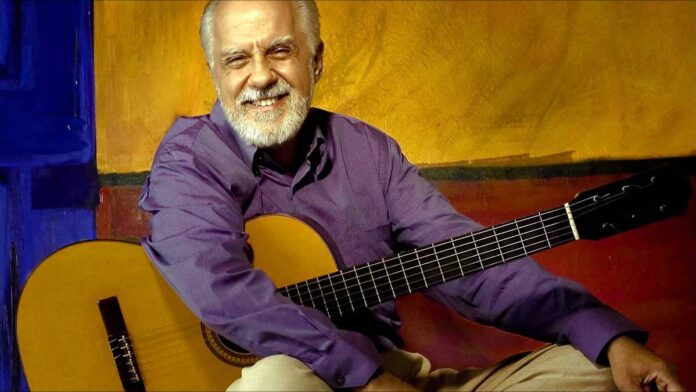Remembering Oscar Castro-Neves is a saudade moment which transcends the boundaries of language and time. This story was originally published on September 28th, 2013.
Remembering Oscar Castro-Neves is a saudade moment which trancends the boundries of language and time. This story was originally published on September 28th, 2013.
By Scott Adams
The news came early; guitarist, producer and songwriter Oscar Castro-Neves had passed away from cancer on Friday at his Los Angeles home.
His brother Pedro Paulo wrote:
“To all friends, fellow musicians, family members we have, Mario, Maria Lina and I, brothers and sister of Oscar, sadness to announce his peaceful death last night, the 27th of September 2013 in Los Angeles, California, and at his side his beloved wife, Lorry and beloved daughters, Bianca and Felicia. Our unforgettable Oscar left us with a lot of love for the Lord.”
For all of his 73 years, Oscar Castro-Neves had an enthusiasm for life that was both infectious and unmistakable. You could hear it in his voice – a pleasant warmth masking an inner intensity, almost as if his voice was holding his boundless energy in check. At once playful, excited, reflective, passionate, the voice was the man.
You could hear it in his music, too. For Oscar, melody and counterpoint would flow and weave about like a Brazilian caipirinha , an unexpectedly smooth and deceptively potent mixture of freshly squeezed limes, sugar and pinga cachaça (Brazil’s barely-aged sugar cane rum).
This effervescence for life also helps us in remembering Oscar Castro-Neves as a de facto Cultural Ambassador for Brazilian music on five continents.
Raised in Rio
Born in Rio de Janeiro May 15, 1940, Oscar’s musical career began at age 14, when he and his brothers formed their first jazz group. They were good enough to make it on local radio and television shows and soon were hanging out with other local musicians named Gilberto, Bonfa, Jobim.
Two years later, everything changed.
“We were just a bunch of musicians who played for the fun of it, showing each other what we’d come up with,” recalled Oscar. “You have to remember that all of these famous Bossa Nova musicians were 16 or 17 years, with the exception of Jobim. He was 30 at the time.
“At a party one day, Alaide Costa, one of Brazil’s top singers at that time heard one of my songs, ‘Chora Tua Tristeza’ (Cry Your Sadness), and asked if she could record it. I was shocked. I said ‘Yes, of course you can!’
“Within a month, that song was number one and by the end of that year there was over 50 different covers recorded. And there I was, only 16 years old with a big hit! It was unbelievable.”
The next opportunity is part of remembering Oscar Castro-Neves and the international role which was waiting for him.
An invitation to the legendary Bossa Nova concert at Carnegie Hall in 1962 led to a tour with Stan Getz, and eventually, to Sergio Mendes.
Joining Brazil ’66 as featured guitarist, musical director, and orchestra conductor brought him to Los Angeles to stay in 1967, and it elevated him to prominence within the music industry.
In his ten years with Mendes, he recorded 15 albums and traveled to every major city world-wide, including a 32-concert tour with Frank Sinatra.
Through his years of development as a skilled composer, arranger, producer, group leader and performer, Oscar Castro-Neves has touched on many musical styles, from sound tracks to pop acts. But he never lost touch with his native Brazil.
Hardest-working Brazilian in show business
He’s worked with Ella Fitzgerald, Barbra Streisand, and Michael Jackson. Quincy Jones, Dave and Don Grusin, Johnny Mandel and Lee Ritenour. Joao Gilberto and Antonio Carlos Jobim, Stan Getz, Minnie Ripperton, and Laurindo Almeida, just to name a few more.
He produced a song with Randy Crawford for the movie Stake Out. His many film scores include Gabriela and Blame it on Rio. He’s worked as an orchestrator on What About Bob, Short Circuit II, Dirty Rotten Scoundrels, Problem Child, K-9, L.A. Story, He Said, She Said and on Sister Act 2.
His documentary work includes Burning Down Tomorrow, (nominated for an Oscar of its own) and Reflections Through A Brazilian Eye, an Emmy nominated television special for KCET in Los Angeles.
Oscar became a US citizen and was also the very proud uncle of Dancing With The Stars and Indy 500 winning driver, Helio Castroneves.
Personaly, remembering Oscar Castro-Neves precedes our formal introductions by several years: His albums on JVC, including 1987’s Brazilian Scandals, Maracujá (1989) and More Than Yesterday in 1991 became part of the musical foundation for The Sounds of Brazil by the time my program made its radio debut in 1992 and while I was writing on Brazilian music for Jazziz.
Our first meeting came in advance of his Tropical Heart album in 1993 – we sat down for an interview that became the basis for the album’s official release, and – happily – for an endearing friendship.
Every year on May 15, I’d call to sing ‘happy birthday’. After the first time, Oscar remarked that I had “a nice singing voice.” I replied that I only sing for my very best friends because I know that they’ll forgive me.
Sometimes, laughter and friendships come easily.
Ambassador of Note
As Cultural Ambassador, Oscar Castro-Neves not only understands the Brazilian Heart, he helped create a good amount of it.
His work with harmonica master Toots Thielemans as co-producer (with Miles Goodman) of The Brasil Project and The Brasil Project, Volume 2 received high acclaim from critics. Even now, it continues to bring generations of jazz fans back to Brazilian pop music.
Years ago, he traveled to Brazil to produce a special live tribute to Antonio Carlos Jobim as part of Brazil’s largest jazz festival. The event was so well received that Oscar decided to continue it annually, often at the Hollywood Bowl.
But when remembering Oscar Castro-Neves, perhaps his greatest gift to us is one that you may not be aware of.
A Brazilian Christmas
Based of the success of The Brasil Project, Oscar Castro-Neves created a new music label with Miles Goodman in 1996. They started work on their first project, a groundbreaking album of traditional Christmas songs set in the Brazilian style.
They invited many of Brazil’s top musicians to join the recording. Instrumental stars included saxophonist Leo Gandelman and guitarists Ricardo Silveira and Toninho Horta, plus keyboardist Gilson Peranzzetta.
The vocals came from Joyce, João Bosco, Dori Caymmi, Ivan Lins, and Bebel Gilberto. The rhythm makers were Tutty Moreno and Têo Lima.
The resulting album was magical, an inspiring blend of vocals in English and Portuguese, with instrumentals to match.
Back then, The Sounds of Brazil was in its fourth year at Smooth Jazz WNUA in Chicago, and had begun to be syndicated nationally.
Inspired by Oscar’s album, The Sounds of Brazil’s first Christmas show aired on December 21, 1996 in more than a dozen US cities. The response was overwhelming.
A few years later, our Christmas tradition expanded to the internet to reach Brazilian friends and families worldwide.
Each year I receive messages from Brazilians living away from their homeland, who write with their appreciation of having a musical touch of home for the holidays.
And we have one gregarious Brazilian to thank for it. Something to reflect on when remembering Oscar Castro-Neves.
Final reflections
All these aspects of Oscar were reflected in his musical life, so a final quote:
“I wanted [my music] to be a glimpse into my own heart, what I’d like to give back for all that I’ve gotten from life. The music is just bits and pieces of what I am. I’ve learned to be more self-accepting, and I think that my music reflects that. I know that I’m the same person on stage as off, I don’t have a stage persona. I am Oscar at all times…”
- Sign up for our emails on music, travel, friends and fun. Listen to our ‘always live’ streaming station and our 12 streaming music channels, always free. Browse our Lifestyle Directory. Click here to like our Facebook page and here for Brazilian events coast to coast.
Our ‘On-Air’ Tribute to Oscar Castro-Neves
This week, we’ll celebrate the musical life of Oscar Castro-Neves on The Sounds of Brazil’s streaming station at Connectbrazil.com, and also on the radio version of our show.
Want a hand in remembering Oscar Castro-Neves? Here are a few personal observations on three of my favorite ‘Oscar’ songs:
Return To Rio:
This one’s from Oscar’s ‘Brazilian Scandals’ CD and one of my all-time favorite albums. The song ‘Return To Rio’ was one of several on this album meant for the movie ‘Blame It On Rio’ (which Oscar was scoring at the time) but did not “make the cut”. What I personally find so appealing on this album is Oscar’s consummate string arrangements. Pure Brazilian musical majesty!
Unconditional Love
Oscar’s ‘More Than Yesterday’ album followed ‘Brazilian Scandals’ a year later in 1992 and it coincided with the debut of my radio show ‘The Sounds of Brazil’. Oscar capitalized on his success with ‘Blame it On Rio’ to carry his orchestral concepts to the max, and this emotional instrumental with Ivan Lins wordless vocals represented a fresh, unique approach to Brazilian jazz. Another ‘must have’ album for your collection… if you can find it.
The Waters of March:
Oscar singing! He was the guitarist on the original classic version on this song, the legendary duet with Antonio Carlos Jobim and Elis Regina, which was recorded in Los Angeles. A fitting way to close out our celebration remembering Oscar Castro-Neves









